Over the course of nearly three hours, proponents and opponents of the moratorium on marijuana sales and production in unincorporated Clark County spoke their peace Wednesday during a work session loaded with statistics and data from both sides of the divide
VANCOUVER — Clark County Council Chair Marc Boldt began a work session focused on marijuana and the ongoing moratorium preventing the legal sale or production of cannabis in unincorporated areas Wednesday by drawing a clear line between how attendees feel about the topic and what they know to be true.
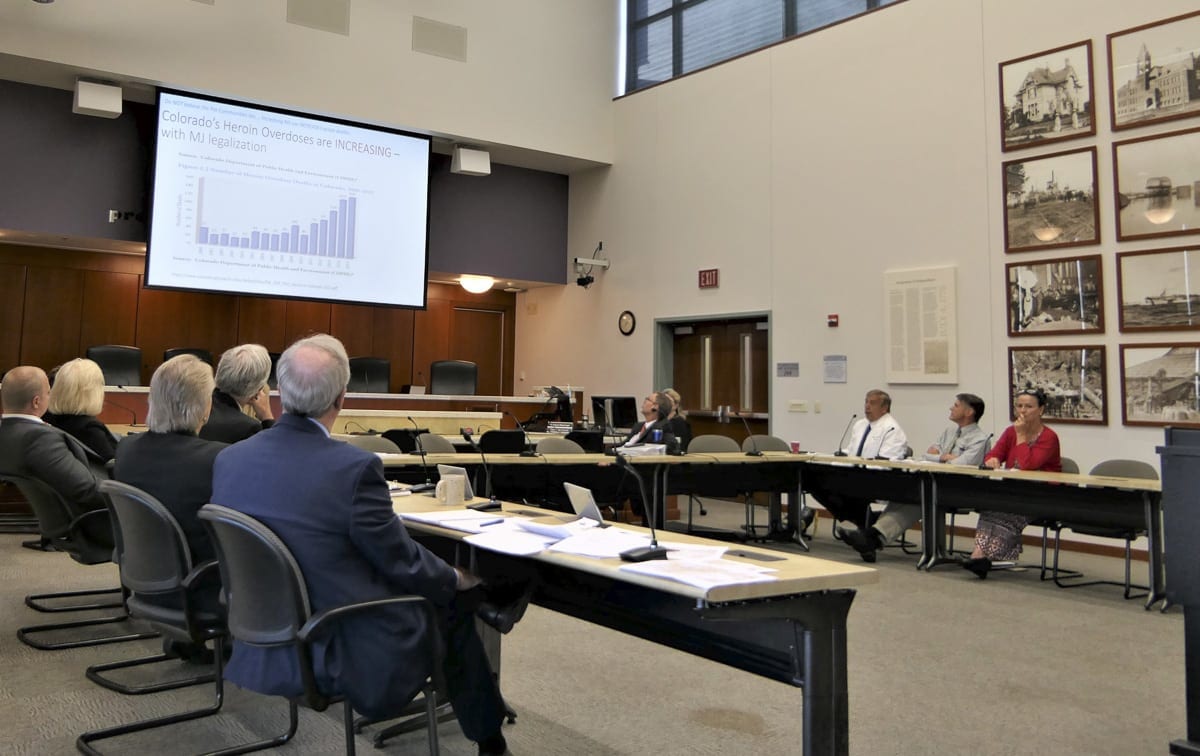
There are facts, he noted, and there are opinions.
“Please don’t mix the two,” he asked a horseshoe-shaped gathering of assorted experts along with a handful of proponents and opponents of the de facto ban, which has been in place since 2014.
While the gathering at the Public Service Center in Vancouver remained civil as attendees largely heeded Boldt’s request, it became apparent again and again throughout the discussion that the abundant, but seemingly incomplete, research on the topic of marijuana as it applies to public safety, health and its overall effect on society allows for an informed stance on either side, though opinions for or against the moratorium are developed through personal experiences, beliefs and analysis.
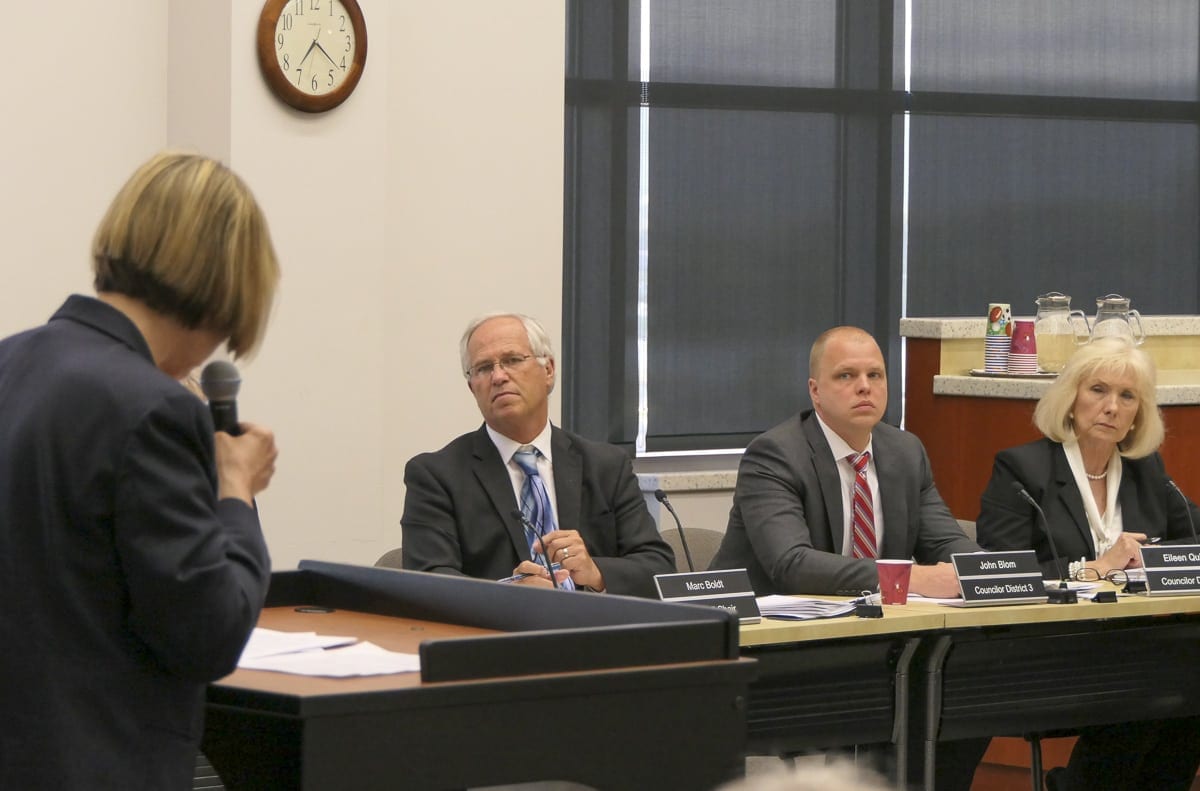
As for the councilors, they left little evidence of their own leanings at the conclusion of the meeting, choosing to make no public statements, though past interviews and comments indicate the current council is leaning away from lifting the ban. Still, some fear the coming election season could alter that status quo, as some who are seeking to join the council are in favor of lifting the moratorium.
Wednesday’s meeting represented a display of competing ideas matched with relative research and statistics.
While several businessmen and women extolled the virtues and benefits of the sale of marijuana — with tax revenue and conformation with much of the rest of the state where marijuana is legally bought, sold and grown leading the list — others lamented the damage they attribute to the consumption and availability of marijuana.
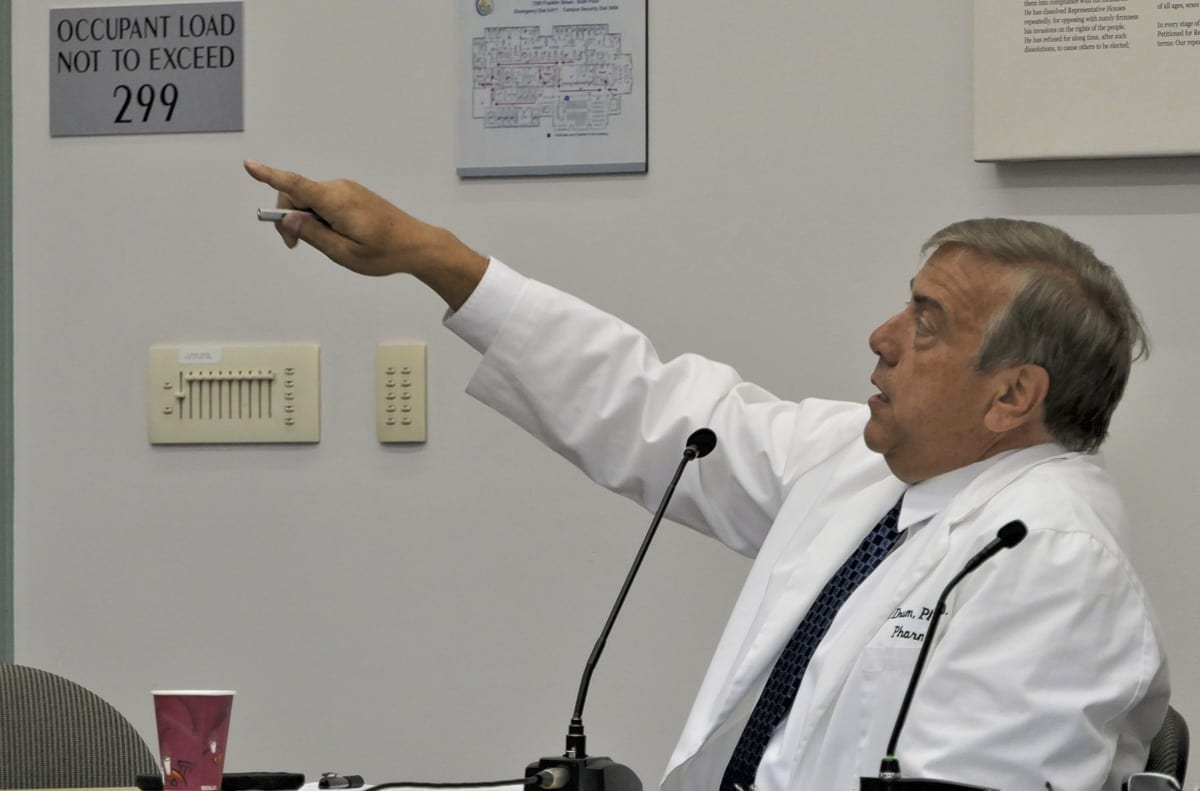
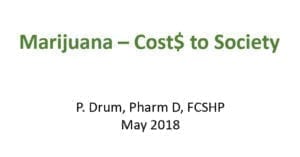
Perhaps the starkest example of the latter sentiment came from Dr. Phillip Drum, a pharmacist and advisory board member for Citizens Against Legalizing Marijuana who took the council through a lightning-fast, 46-slide Powerpoint display that sought to outline what his own research and that of others has led him to believe, and that’s that legalizing cannabis comes at a great cost to society in innumerable ways.
About halfway through the presentation, Drum advanced to a slide showing several photographs of the moments before, during and after his sister was struck and killed by a driver who was under the influence of marijuana in Seattle in 2012.
It was the same year Washington residents voted to approve Initiative-502, legalizing the sale and production of recreational marijuana in the state as part of a movement that has continued to grow across the country, with about 60 percent of the nation residing in areas where cannabis is now legal, according to some data.

In a twist of fate, the man who struck Drum’s sister was sentenced the day after voters passed the initiative into law.
“A marijuana impaired driver killed my sister,” Drum wrote as part of the presentation. “Pot has been and always will be a hallucinogen. Nobody’s ‘high’ was worth my sister’s life.”
The personal experiences of others who favor the lifting of the ban were also heard by the council, which sought to divide time evenly between opponents, proponents and representatives of the Washington State Liquor Control Board and the Clark County Sheriff’s Office.
Supporters of lifting ban highlight promise of tax revenue
As it stands, there are 508 cannabis retail licenses and well over 1,000 producer and processor licenses issued by the state Liquor and Cannabis Board in Washington.
By the latest count, four licenses have been issued for retailers in unincorporated Clark County along with nine for producers and processors. Of course, as representatives of the Liquor and Cannabis Control Board indicated Wednesday, the moratorium has in all but one case prevented the would-be businesses from opening for customers.
Critics of the ban point to the windfall of revenue delivered into the coffers of local governments through the sale of marijuana. Just this year, the city of Vancouver — which along with Battle Ground allows for the enterprises — has sales totaling $53,883,298. Through a formula included in state regulations, $498,420 has been distributed back to the city.
In Battle Ground, year to date numbers show sales of $2,548,999 and a tax yield of $37,333.
Called upon to offer financial expertise, Clark County Auditor’s Office Finance Director Mark Gassaway provided estimates for what Clark County could expect if the moratorium were to be suddenly lifted by vote of the council.
By estimating proportional sales and comparing that to the county’s population, Gassaway said in 2018 the county could have received $575,000 to $625,000 in tax revenue. Forecasting for growth in the population and industry, that yield could increase to $725,000 to $750,000 per year by 2020, he said.
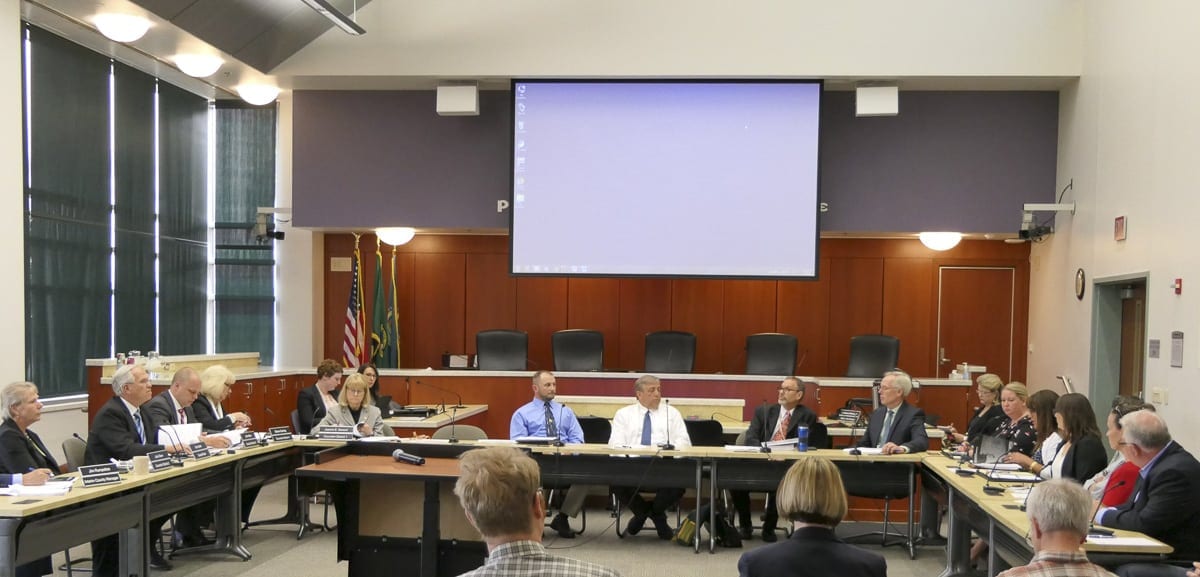
A pair of local members of the marijuana industry spoke favorably of the possibilities for Clark County should the moratorium cease to exist.
John Britt, of High 5 Cannabis in Vancouver, surmised that if the ban were to be lifted, it wouldn’t take much time for businesses develop roots.
“You are going to find the four people who have licenses will be at your doorstep the day you say it,” Britt said.
While suggesting the council consider discussion of zoning that could help guide and corral retailers and processors into specific areas, he spoke against the notion that those in the state’s cannabis industry would seek to act illegally in order to hide revenue or otherwise run afoul of the law.
He said he and others are “locked down every which way” by the Liquor and Cannabis Control Board and that safeguards are in place to ensure the industry acts as is intended by law.
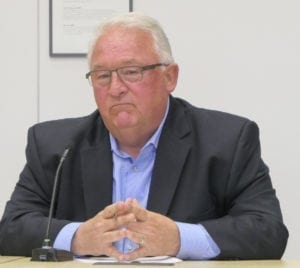
Jim Mullen, owner of The Herbery, acknowledged that available data and experiences allow for arguments on both sides of the debate, but he echoed and amplified Britt’s stance that the cannabis industry is a business like any other, with the exception that those who sell or produce marijuana face a larger tax burden, more stringent regulations and stricter requirements aimed at keeping their products out of the hands of both youths and criminals.
“They’re not going to risk losing it by doing something stupid,” Mullen said.
Mullen said the requirement that all payments for marijuana be made with cash rather than debit or credit cards does create safety concerns, though the industry is continuing to take steps in hopes of gaining favor with financial institutions fearful of the reality that the federal government still considers cannabis to be a schedule 1 controlled substance.
It’s a high-risk business, he admitted, and one that is equally highly-regulated.
Tax revenue is a “soft benefit” for allowing the industry to take hold, he said, but the real asset is the creation of well-paying jobs. He said he now has 66 employees and that many of them were recently granted full health care coverage in addition to what he considers to be a fair wage.
As the county councilors have repeatedly stressed a desire to maintain a role of prevention, specifically when it comes to youths, Mullen said his business and others have done the same, installing identification scanners and banning vertical driver’s licenses that could indicate a potential buyer is underage.
Britt put an exclamation point on the perspective of opponents of the moratorium by returning to the issue of revenue upon questioning from Councilor Jeanne Stewart, who has in the past opposed the lifting of the ban.
“We pay insane amounts of taxes,” he said.
That prompted additional questioning from Councilor John Blom, a potential supporter for ending the moratorium, who asked Britt how far his business is from unincorporated Clark County.
His answer was “150 yards or so.”
“If you were just across the street you’d be illegal?” Blom asked.
“That’s correct,” Britt responded.
The line of questioning seemed to allude to a point later made by another marijuana proponent, Christy Stanley, who punctuated a presentation by colleague Bill Coughlin on the broadening acceptance of the cannabis industry across the country, the perceived health benefits of marijuana and purportedly unaffected crime rates with a statement that encapsulated another often repeated refrain of like-minded individuals; with the existence of the black market and legal sales in Vancouver, Battle Ground and other areas of the state, it’s not a question of whether there is marijuana in Clark County.
“Cannabis is here in Clark County,” she said. “You just have to decide if you want it to be here legally or illegally.”
Continuing a theme throughout the meeting, Councilor Stewart questioned some of the claims of the marijuana supporters, specifically taking issue with a claim that a drop in admissions for opioid addictions has accompanied the end of prohibition of cannabis in areas where it is now legal.
Coughlin offered to seek additional research to back his claim, but Stewart asserted that the “extra buzz” provided by marijuana in addition to the use of opioids should not be seen as a benefit.
“That’s the worst-case scenario,” she said.
Opponents of lifting ban say statistics support them
Just as members of the marijuana industry came baring a plethora of studies, statistics and anecdotes to support their position, so too did those who fear broadening the availability of cannabis in Clark County would lead to dire consequences.
Drum, the pharmacist and advisory board member for Citizens Against Legalizing Marijuana, noted that medicine utilizing THC — the active ingredient in marijuana that delivers a high — have been available since 1985. Their use is not prevalent, he said, because there are far more effective alternatives.
Cannabidiol, for example, has proven to cause side effects and only yield positive results for one in four children with rare seizures, he said.
Drum called into question the often repeated statement that the illegality of marijuana makes it difficult to research, noting that 848 National Institutes of Health grants are funded by the U.S. government for marijuana research, more than 500 studies are listed in clinical trials and more than 120 investigators are currently licensed by the Drug Enforcement Administration to conduct research with marijuana and cannabinoids.
He also lamented current testing practices for marijuana impairment in drivers, a topic that is of deep importance to him due to the death of his sister, he said. Two hours after smoking marijuana, its presence in blood begins to fall below legal limits, he said, noting that alcohol remains in the bloodstream at steady levels for several more hours.
Because of that, he said, many drivers are getting away with putting the lives of others at risk because it takes at least two hours for an officer to process an arrest and obtain a search warrant for a blood draw, steps Drum says are unnecessary.
Drum’s extensive presentation (which is embedded at the end of this article) additionally claimed that statistics show an increase in hospitalizations due to marijuana, use of the drug by youths and homelessness in addition to tangible and intangible costs for society at large.
After the meeting, he said he’s confident his statistics are correct, though many in the room expressed obvious skepticism as he attacked the legalization of marijuana from all angles.
“It’s not the ‘maybes’ and the ‘possibilities,’” Drum said. “That what they were showing … All they mention is the money. That’s all they care about.”
“This will be a disaster if you let this happen in your county,” he said.
Though Drum was visiting southwest Washington, a couple residents who have long been opposed to increased access to marijuana also spoke to the council during a public comment period that allowed for three minutes for each speaker.

Ann Donnelly, a Phd. and advocate for the mentally ill who is currently on the boards for the National Alliance on Mental Illness Southwest Washington and Columbia River Mental Health Services, said expanding the availability of the drug in Clark County would disproportionately impact those struggling with mental illnesses.
Citing personal experience with a family member, she said more cannabis storefronts would lead to more waste of antipsychotic drugs, diversion of scarce funds, elimination of employment opportunities, increased distortion of reality and a number of other ill effects.
Adults likewise are not served by cannabis use, she said, citing a 2017 Washington Institute of Public Policy study that found “adults 21 and older in counties with more retail cannabis sales were more likely to report using cannabis in the last 30 days and using it heavily.”
“Are those adults using pot heavily more or less likely to get a new higher paying job, or even keep their current job?” she asked. “Are they more or less likely to drive their kids safely? Read to their kids at night? Or help them with their homework? Or set a good example for them?
I contend that heavy pot users cost society much more than the pot taxes they pay.”
Dan Duringer, another opponent of lifting the pot ban, has long spoken out against the expanded availability of the drug. As a school bus driver and one who has a degree in human development from Washington State University, he likewise fears the societal impacts of the cannabis.
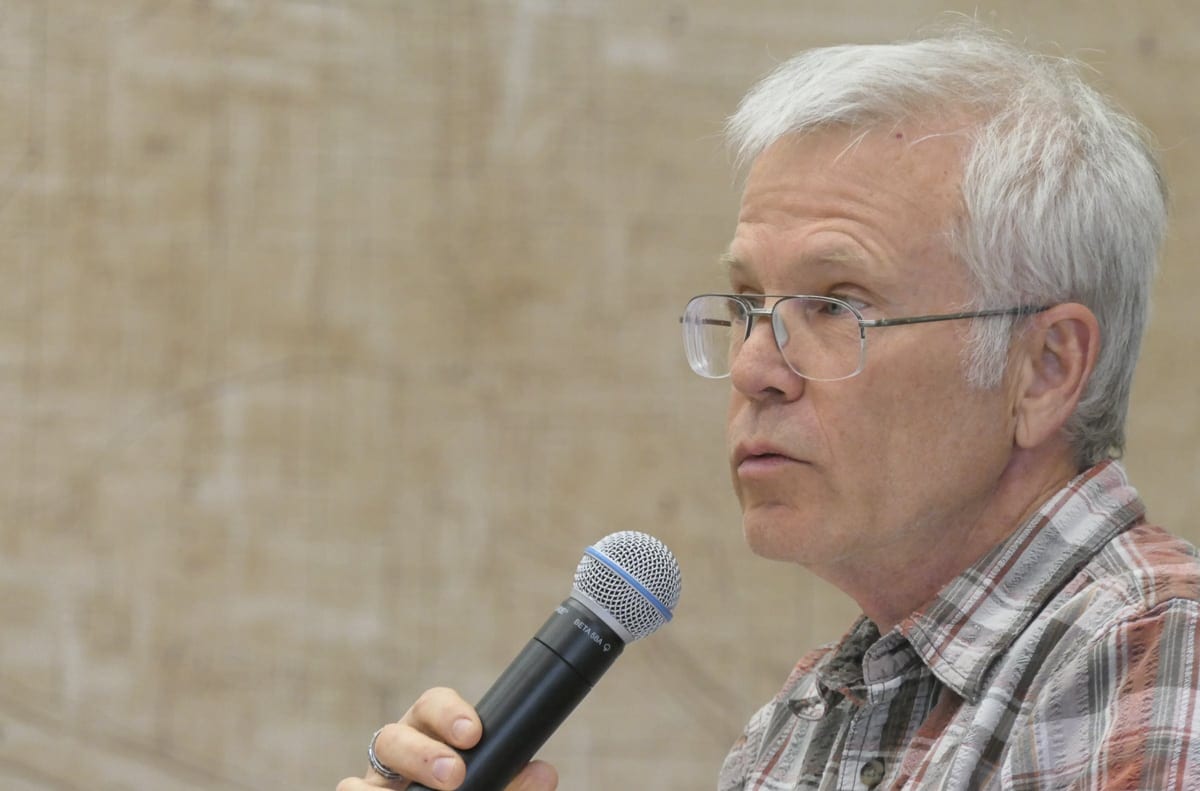
He said his experience has taught him that use of the drug can harm children in many ways, whether it’s through their own use of it or that of their parents who in turn neglect them. In April, he spoke at length with ClarkCountyToday.com about the many reasons he has taken such a strong stance against the lifting of the moratorium. You can read that story here:
Clark County residents use April 20, an unofficial pot holiday, to advocate against spread of availability
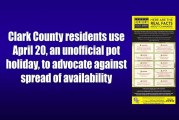
On Wednesday, Duringer showed the council a 2-by-3 yard sign he said was being made available to residents of Clark County who, like him, are adamantly opposed to the expansion of marijuana availability. The signs, printed in green, red and yellow lettering, states simply “Marijuana is a dangerous drug. Say yes to life.”
Duringer also displayed an electoral map that showed most of unincorporated Clark County was opposed to the legalization of marijuana when the matter went before voters in 2012.
“Politically I’d hope that you’d consider that,” he said.
Prosecutor, Sheriff’s Office provide perspective
In addition to statistics regarding marijuana use and its effects on society from a national and international perspective, representatives from the Clark County Sheriff’s Office and the Clark County Prosecuting Attorney’s Office provided a look at what the legality of the drug in the state and its standing as a controlled substance means for enforcement and charging decisions locally.
Emily Sheldrick, chief civil prosecuting attorney, advised the council and those in attendance of the changes between the approaches of the administration of President Barack Obama and that of President Donald Trump. While neither has chosen to actively arrest or prosecute those engaged in industries deemed legal in state’s such as Washington, the consumption, sale or production of marijuana is still very much illegal in the eyes of the federal government, she noted.
As far back as 2009, the Obama administration issued a memo indicating it would focus on preventing the drug from falling into the hands of youths while taking an aggressive approach toward rooting out cartel involvement in the marijuana trade, along with other criminal activity.
There were instances of additional guidance from the federal government in the years since, with the most recent coming from the Trump Administration in January.
While there have been subtle differences to the approach, the view of Uncle Sam has remained the same, she said.
The bottom line, federally or at the county level, discretion lies with the prosecutors when it comes to charges, and thus far no one is Clark County has been prosecuted for activity deemed legal by the state.
“Federal law has not changed in all these years,” she said.
Sgt. Bill Sofianos, representing the Sheriff’s Office and the Clark-Vancouver Drug Task Force, walked councilors through a series of information garnered from the agencies records in regards to emergency responses to area marijuana retailers. In the last four years, Vancouver police have responded to cannabis retailers a total of 412 times, he said, with alarms, suspicious or unwanted people and theft representing some of the reasons. (Read the full presentation here: https://www.clark.wa.gov/sites/default/files/dept/files/the-grid/2018/2018_Q2/053018WS_DrugTaskForcePres.pdf)
In most cases, the retailers required many more visits from law enforcement than surrounding businesses unrelated to the industry, Safianos said, with calls often including intoxicated customers, unwanted trespassers and individuals asking others to buy marijuana for them.
As far as citizen complaints, Sofianos said one of the most prevalent is in regards to the odor emitted by marijuana. Since August 2016, the Drug Task Force has received 160 complaints regarding marijuana possession, odor, manufacturing and distribution, he said. Broken down further, there were 94 complaints in unincorporated Clark County, 42 in Vancouver, three in Washougal, two in Battle Ground, two Ridgefield, one in Woodland and 16 from unknown locations.
Safianos admitted there are not a lot of positive calls regarding marijuana.
“We rarely ever get the calls that are like, ‘Hey, I’m really happy my neighbor’s smoking marijuana,’” he said.
Beyond complaints, Sofianos pointed to a Washington Traffic Safety Commission report that showed the No. 1 contributing factor in fatal crashes in Washington has been driver impairment due to drugs or alcohol. Polydrug, a term for combinations of alcohol and drugs, is the most common kind of impairment.
The most common substance in polydrug drivers is alcohol followed by THC, he said.
Sofianos says his experience on patrols has reflected the findings of the commission.
“I’ve talked with more than one person who says they drive better smoking marijuana,” he lamented.
Councilors make no comments
While some on the Clark County Council have made their stances regarding the ban public, others, such as Julie Olson, said as recently as last week they are undecided when it comes to the possibility of lifting the moratorium.
Boldt broached the possibility of allowing processing of marijuana and keeping the ban on retail sale in place.
Councilors Eileen Quiring and Jeanne Stewart have spoken in favor of the ban remaining in place, and during Wednesday’s hearing, their questions of speakers seemed to remain critical of expanded availability.
Blom has spoken in favor of lifting the ban.
When given the opportunity to respond to the abundance of information and discussion presented Wednesday, none of the councilors chose to do so, and instead Boldt brought the meeting to a close.
“This gives us a lot to discuss and we will do more in a short period of time,” Boldt said.




